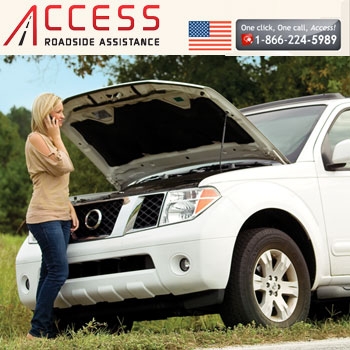Emergency Roadside Help

Finally, springtime has arrived. It’s easy to assume that warmer weather and sunny skies automatically means safer driving conditions and less traffic accidents and fatalities.
At Access Roadside Assistance this a common misconception shared by many of their emergency roadside help members and an incorrect one. In addition to having its own set of roadside hazards (i.e. black ice, potholes, etc.), spring is also is a time when historically there is a 5 to 7% increase in accident fatalities during the three days following the onset of daylight savings time. Researchers at Carnegie Mellon University in Pittsburg found in 2007 that daylight savings has a significant impact on the number of pedestrian fatalities immediately following the time change with pedestrians being three times more likely to be fatally struck, especially during rush hour (after 6 pm).
Access therefore recommends that all of their emergency roadside help members, and all drivers, take the time to acquaint themselves with the risks of springtime driving, including increased fatigue and inattention from sleep deprivation caused by daylight savings, before heading out on the road. They also recommend following a few common sense springtime safe driving tips.
Tip #1: Snow tires should be kept on all vehicles until the weather is consistently stable at or above 7 degrees Celsius as snow can still unexpectedly hit.
Tip #2: Drivers should always be vigilant about black ice. With the spring comes melting ice and snow on and near the roadways. If the temperature drops below freezing at night, this run off could easily freeze and lead to skidding and/or sliding. This is a common call out Access Roadside Assistance receives for emergency roadside help in the spring.
Tip #3: Along with an increase in the number of vehicles out and about in the sunny spring weather, comes a need to be extra vigilant about motorcyclists and cyclists. Drivers should always check their blind spots and leave plenty of following distance between their vehicle and motorcycle and bike riders.
Tip #4: Drivers of motorcycles, scooters, and bicycles should take care to show consideration to other drivers by following the rules of the road (keeping right, riding single file) and ensuring that they are fully visible at all times to others by wearing coloured clothing and/or safety vests and using lights. For extended safety while on the road, Access is proud to offer motorcycle and scooter emergency roadside help membership options.
Tip #5: The nicer weather means more children and adults out in parks and other recreation areas so drivers stay alert to pedestrians on the roadways, sidewalks, in crosswalks, etc.
Tip #6: Drivers need to be cautious of unexpected potholes. With the changes in temperature comes an increase in new pothole formations. Drivers can avoid unnecessary wear and tear on their vehicles by staying aware of where potholes are situated.
Tip #7: Drives are reminded to regularly listen to traffic updates regarding localized flooding and to find an alternate route if necessary.
Tip #8: Drivers should exercise caution when pulling onto gravel shoulders as run-off from melting snow and excess rain can cause the gravel to erode and soften. Access would like to remind drives that they are always just emergency roadside help call away for towing.
Tip #9: Less traveled roads may still contain residue from leftover sanding and salting which can cause the roadway to be slick and slippery. Drivers should take caution when traversing these types of roadways.
Tip #10: With spring comes the end of hibernation season which means that drivers may find themselves sharing the road with the odd wild animal here and there. Drivers are reminded to slow down in rural areas or where animal traffic is known to be high.
